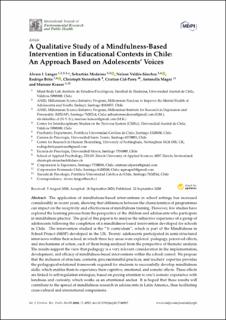Please use this identifier to cite or link to this item:
https://doi.org/10.21256/zhaw-20520Full metadata record
| DC Field | Value | Language |
|---|---|---|
| dc.contributor.author | Langer, Álvaro I. | - |
| dc.contributor.author | Medeiros, Sebastián | - |
| dc.contributor.author | Valdés-Sánchez, Nelson | - |
| dc.contributor.author | Brito, Rodrigo | - |
| dc.contributor.author | Steinebach, Christoph | - |
| dc.contributor.author | Cid-Parra, Cristian | - |
| dc.contributor.author | Magni, Antonella | - |
| dc.contributor.author | Krause, Mariane | - |
| dc.date.accessioned | 2020-09-24T14:26:20Z | - |
| dc.date.available | 2020-09-24T14:26:20Z | - |
| dc.date.issued | 2020 | - |
| dc.identifier.issn | 1660-4601 | de_CH |
| dc.identifier.issn | 1661-7827 | de_CH |
| dc.identifier.uri | https://digitalcollection.zhaw.ch/handle/11475/20520 | - |
| dc.description | This article belongs to the Special Issue "Mental Health of Child and Young People". | de_CH |
| dc.description.abstract | The application of mindfulness-based interventions in school settings has increased considerably in recent years, showing that differences between the characteristics of programmes can impact on the receptivity and effectiveness of mindfulness training. However, few studies have explored the learning process from the perspective of the children and adolescents who participate in mindfulness practice. The goal of this paper is to analyse the subjective experience of a group of adolescents following the completion of a mindfulness-based intervention developed for schools in Chile. The intervention studied is the “.b curriculum”, which is part of the Mindfulness in School Project (MiSP) developed in the UK. Twenty adolescents participated in semi-structured interviews within their school, in which three key areas were explored: pedagogy, perceived effects, and mechanisms of action, each of them being analysed from the perspective of thematic analysis. The results support the view that pedagogy is a very relevant consideration in the implementation, development, and efficacy of mindfulness-based interventions within the school context. We propose that the inclusion of structure, contents, process/mindful practices, and teachers’ expertise provides the pedagogical-relational framework required for students to successfully develop mindfulness skills, which enables them to experience their cognitive, emotional, and somatic effects. These effects are linked to self-regulation strategies, based on paying attention to one’s somatic experience with kindness and curiosity, which works as an attentional anchor. It is hoped that these results will contribute to the spread of mindfulness research in adolescents in Latin America, thus facilitating cross-cultural and international comparisons. | de_CH |
| dc.language.iso | en | de_CH |
| dc.publisher | MDPI | de_CH |
| dc.relation.ispartof | International Journal of Environmental Research and Public Health | de_CH |
| dc.rights | http://creativecommons.org/licenses/by/4.0/ | de_CH |
| dc.subject | Mindfulness-based intervention | de_CH |
| dc.subject | Adolescence | de_CH |
| dc.subject | Education | de_CH |
| dc.subject | Prevention | de_CH |
| dc.subject | Mental health | de_CH |
| dc.subject.ddc | 155: Differentielle Psychologie und Entwicklungspsychologie | de_CH |
| dc.subject.ddc | 305: Personengruppen (Alter, Herkunft, Geschlecht, Einkommen) | de_CH |
| dc.title | A qualitative study of a mindfulness-based intervention in educational contexts in Chile : an approach based on adolescents’ voices | de_CH |
| dc.type | Beitrag in wissenschaftlicher Zeitschrift | de_CH |
| dcterms.type | Text | de_CH |
| zhaw.departement | Angewandte Psychologie | de_CH |
| zhaw.organisationalunit | Psychologisches Institut (PI) | de_CH |
| dc.identifier.doi | 10.3390/ijerph17186927 | de_CH |
| dc.identifier.doi | 10.21256/zhaw-20520 | - |
| zhaw.funding.eu | No | de_CH |
| zhaw.issue | 18 | de_CH |
| zhaw.originated.zhaw | Yes | de_CH |
| zhaw.pages.start | 6927 | de_CH |
| zhaw.publication.status | publishedVersion | de_CH |
| zhaw.volume | 17 | de_CH |
| zhaw.publication.review | Peer review (Publikation) | de_CH |
| zhaw.author.additional | No | de_CH |
| zhaw.display.portrait | Yes | de_CH |
| Appears in collections: | Publikationen Angewandte Psychologie | |
Files in This Item:
| File | Description | Size | Format | |
|---|---|---|---|---|
| 2020_Langer-etal_Mindfulness-based-intervention-education-Chile_ijerph.pdf | 997.82 kB | Adobe PDF |  View/Open |
Show simple item record
Langer, Á. I., Medeiros, S., Valdés-Sánchez, N., Brito, R., Steinebach, C., Cid-Parra, C., Magni, A., & Krause, M. (2020). A qualitative study of a mindfulness-based intervention in educational contexts in Chile : an approach based on adolescents’ voices. International Journal of Environmental Research and Public Health, 17(18), 6927. https://doi.org/10.3390/ijerph17186927
Langer, Á.I. et al. (2020) ‘A qualitative study of a mindfulness-based intervention in educational contexts in Chile : an approach based on adolescents’ voices’, International Journal of Environmental Research and Public Health, 17(18), p. 6927. Available at: https://doi.org/10.3390/ijerph17186927.
Á. I. Langer et al., “A qualitative study of a mindfulness-based intervention in educational contexts in Chile : an approach based on adolescents’ voices,” International Journal of Environmental Research and Public Health, vol. 17, no. 18, p. 6927, 2020, doi: 10.3390/ijerph17186927.
LANGER, Álvaro I., Sebastián MEDEIROS, Nelson VALDÉS-SÁNCHEZ, Rodrigo BRITO, Christoph STEINEBACH, Cristian CID-PARRA, Antonella MAGNI und Mariane KRAUSE, 2020. A qualitative study of a mindfulness-based intervention in educational contexts in Chile : an approach based on adolescents’ voices. International Journal of Environmental Research and Public Health. 2020. Bd. 17, Nr. 18, S. 6927. DOI 10.3390/ijerph17186927
Langer, Álvaro I., Sebastián Medeiros, Nelson Valdés-Sánchez, Rodrigo Brito, Christoph Steinebach, Cristian Cid-Parra, Antonella Magni, and Mariane Krause. 2020. “A Qualitative Study of a Mindfulness-Based Intervention in Educational Contexts in Chile : An Approach Based on Adolescents’ Voices.” International Journal of Environmental Research and Public Health 17 (18): 6927. https://doi.org/10.3390/ijerph17186927.
Langer, Álvaro I., et al. “A Qualitative Study of a Mindfulness-Based Intervention in Educational Contexts in Chile : An Approach Based on Adolescents’ Voices.” International Journal of Environmental Research and Public Health, vol. 17, no. 18, 2020, p. 6927, https://doi.org/10.3390/ijerph17186927.
Items in DSpace are protected by copyright, with all rights reserved, unless otherwise indicated.